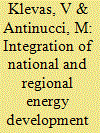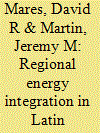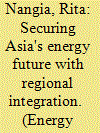| Srl | Item |
| 1 |
ID:
049739


|
|
|
|
|
| Summary/Abstract |
The report is dedicated to the presentation of the general framework of regional energy planning activities in Baltic States. The objective is to provide information on the context, in which regional energy policy instruments have to operate, and which has to be taken into consideration when compiling energy development measures for regional development and structural funds. The major issue of the publication is to discuss perspective of the formation methodology for energy management integration into development of regional planning documents. The main objective of this publication is to make a brief overview of what are the prospects of regional energy development.
The place of municipal and regional energy development programs in general energy investment strategy is defined. The guidelines for regional energy programs are presented.
|
|
|
|
|
|
|
|
|
|
|
|
|
|
|
|
| 2 |
ID:
110106


|
|
|
|
|
| Publication |
2012.
|
| Summary/Abstract |
In the 1990s regional economic integration regained popularity as a means for promoting sustainable economic development in the developing world. Latin America, where market liberalisation and pro-market presidents proliferated in that decade, emblemised this belief. Even today, when pro-state intervention governments are on the upswing, the rhetoric of economic integration continues. Yet integration schemes are faltering. This article presents a case study to demonstrate that neither markets nor political will of leaders can produce successful economic integration unless the politics of integration have been favourably resolved. Chile best exemplifies this situation. Chile's lessons learned through their natural gas and energy development model serve as an excellent prism for analysing the political economy of regional economic integration and speculating on what types of regional energy integration schemes can work best.
|
|
|
|
|
|
|
|
|
|
|
|
|
|
|
|
| 3 |
ID:
167043


|
|
|
|
|
| Summary/Abstract |
A fundamental shift is taking place in the geography of global energy demand towards developing countries, especially to Asia. Rapid economic growth, changing demographics, and growing urbanization mean China, India, and the other developing Asian economies will continue to account for an ever-increasing share of global energy consumption, rising to 52% of electricity, 80% of coal, and 26% of world natural gas demand by 2040 (IEA, 2018). Given the limited resource endowments, Asia's energy future remains vulnerable to global sources of supplies and price volatility, with potential threats to ongoing economic development. Regional integration of energy markets through agglomeration effects, cost efficiencies as a result of economies of scale and scope, new investments, human capability enhancements, and diversity of energy sources will help to increase Asian energy security. Till day, Asian energy markets remain fragmented and the research identifies present challenges to regional integration in Asia.
|
|
|
|
|
|
|
|
|
|
|
|
|
|
|
|